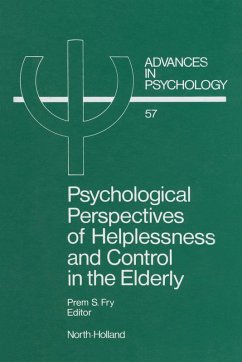Leading psychologists and social science researchers from the United States, Canada and Europe give their views on the meaning and application of control-related constructs having specific implications for the field of human aging. They address themselves to one or more of the major themes, issues or concerns which currently figure in discussions of control beliefs and control constructs as they apply to aging and old age.
Written primarily for scholars, researchers and developmental theorists interested in the complexities and generativity of control constructs and their applications for the psychological well-being of older adults, the data and issues presented will be equally informative to gero-psychologists and mental health professionals concerned with healthy adaptive functioning of the elderly.
Dieser Download kann aus rechtlichen Gründen nur mit Rechnungsadresse in A, B, BG, CY, CZ, D, DK, EW, E, FIN, F, GR, HR, H, IRL, I, LT, L, LR, M, NL, PL, P, R, S, SLO, SK ausgeliefert werden.









